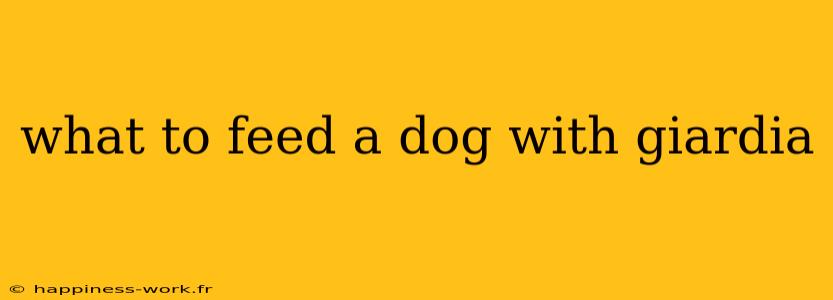Dealing with a dog infected with Giardia can be challenging and concerning for pet owners. Giardia is a protozoan parasite that causes gastrointestinal distress, often leading to symptoms like diarrhea, vomiting, and weight loss. Proper nutrition can support your dog's recovery and overall health. In this article, we will explore what to feed a dog with Giardia, offering insights and tips for managing their diet during recovery.
Understanding Giardia in Dogs
Giardia is commonly transmitted through contaminated water, food, or surfaces. The parasite affects the intestines, disrupting nutrient absorption. This can lead to:
- Diarrhea: The most common symptom, which can be intermittent or persistent.
- Vomiting: A less common symptom but still relevant.
- Weight Loss: Due to loss of appetite and nutrient absorption issues.
To ensure your dog’s recovery, it’s crucial to provide the right diet. Here’s how to approach feeding your dog while they battle Giardia.
What Should You Feed a Dog with Giardia?
1. Bland Diet
Initially, if your dog shows severe gastrointestinal symptoms, it's advisable to start with a bland diet. This can help soothe their digestive system.
Recommended Bland Foods:
- Boiled Chicken (without skin or bones)
- Rice (white rice is easier on the stomach)
- Pumpkin Puree (not the spiced pie filling; it can help firm up stools)
2. Hydration is Key
Ensure your dog has constant access to fresh, clean water. Dehydration can be a significant concern with diarrhea. You can also consider offering:
- Electrolyte Solutions: Designed for pets to restore lost minerals.
3. Introduce Probiotics
Probiotics can help restore the natural gut flora in dogs recovering from Giardia. This can support digestion and overall gut health.
- Probiotic Supplements: Consult your veterinarian for recommended brands suitable for dogs.
4. Slowly Transition Back to Regular Food
Once your dog shows improvement, you can gradually introduce their regular food. Make this transition over several days to minimize any further digestive upset.
Note: If your dog was on a commercial diet, ensure it's high-quality and easily digestible. Look for options that contain:
- High-Quality Proteins: Like chicken or fish.
- Digestive Aids: Such as prebiotics and probiotics.
5. Avoid Certain Foods
During this time, avoid the following foods:
- Fatty Foods: These can aggravate gastrointestinal issues.
- Dairy Products: Many dogs are lactose intolerant, which can worsen their symptoms.
- Human Food: Certain spices or seasonings can be harmful to dogs.
Additional Support and Care
In addition to proper nutrition, consider the following steps to support your dog’s recovery:
- Regular Vet Check-ups: Follow up with your veterinarian to monitor your dog’s progress and ensure the Giardia infection is cleared.
- Maintaining a Clean Environment: Clean your dog’s living area frequently to prevent re-infection. Giardia can survive in the environment for months.
- Regular Hand Washing: Always wash your hands after handling your dog or cleaning up after them to reduce the risk of spreading the parasite.
Conclusion
Feeding a dog with Giardia requires careful attention to their dietary needs and overall health. A bland diet, proper hydration, and gradual reintroduction of regular food are essential steps in supporting their recovery. As you manage your dog's diet, don't forget to seek guidance from your veterinarian to ensure you're making the best choices for their health.
Additional Resources:
- Veterinary Diet Formulas: Some pet food brands offer specialized diets for gastrointestinal health, which can be beneficial during recovery.
- Online Support Groups: Consider joining forums or support groups for dog owners dealing with Giardia to share experiences and receive support.
By following these guidelines, you can help your furry friend overcome their Giardia infection and return to their happy, playful self.
